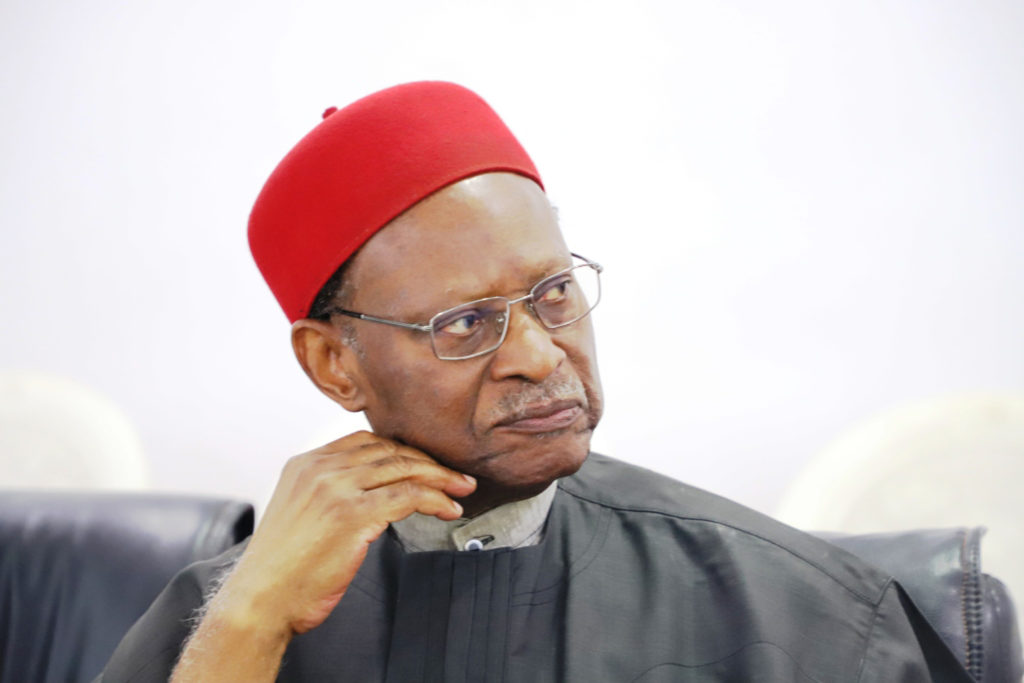692
By Lizzy Chirkpi
In a move to overhaul Nigeria’s governance structure, elder statesmen, intellectuals, and civil society leaders under the banner of the Eminent Patriots of Nigeria have issued a clarion call for a people-driven constitution that reflects Nigeria’s diversity and democratic aspirations.
Meeting at a National Constitutional Summit in Abuja, the group unanimously rejected the 1999 Constitution (as amended), describing it as a military-imposed document lacking legitimacy and relevance in today’s democratic landscape.
Reading from the summit’s communiqué, Chairman and former Commonwealth Secretary-General, Chief Emeka Anyaoku, said delegates advocated a complete restructuring of Nigeria’s political system to address what they described as chronic dysfunction rooted in the nation’s current constitutional framework.
“The Summit agreed that the 1999 Constitution (as amended) is deeply flawed and unrepresentative in that it was not made by the people and is inadequate for addressing the country’s pluralism and the various challenges confronting Nigeria as a nation,” Anyaoku declared.
The group also urged President Bola Tinubu to sponsor an Executive Bill empowering the Independent National Electoral Commission (INEC) to conduct elections into a non-partisan Constituent Assembly, comprising elected delegates and representatives of key interest groups. This assembly, they said, would be responsible for drafting a new constitution to be subjected to a national referendum.
“This Assembly shall be made up of delegates elected on non-partisan basis as well as representatives of special interest groups,” Anyaoku explained.
“It will midwife a people’s democratic constitution that will be submitted to a referendum before presidential assent.”
A recurring theme at the summit was the need to decentralize power and establish true federalism, returning autonomy to federating units akin to the First Republic.
“The current political reality is that too much power is concentrated at the centre. Quite enormous powers are currently concentrated in the presidency,” the communiqué read.
“The Summit recommends the devolution of powers to the federating units and a cost-effective single-chamber legislature.”
The delegates advocated replacing the present presidential system with a more affordable, less centralized structure. The group also recommended that Nigeria’s six geopolitical zones be given formal constitutional recognition to support a more equitable federal balance.
To tackle growing insecurity, it further called for a legislative framework to enable the establishment of state police, stressing the inadequacy of a centrally controlled security system.
They further proposed reforms to the judicial structure, including separating the roles of Attorney-General and Minister of Justice at the federal level and similarly at the state level in order to promote independence and professionalism.
“Each federating unit should have its own courts up to the Court of Appeal, while the Supreme Court handles only major constitutional and intergovernmental disputes,” the communiqué stated.
In a nod to international best practices, the group also demanded that all elections be conducted in a single day, citing models like Brazil and Ghana as examples of efficient and fraud-resistant electoral systems.
The group also pressed for amendments to the Electoral Act to make BVAS and electronic transmission of results mandatory. Other key proposals included provisions for independent candidacy and stricter anti-defection laws.
“Once a person is elected on the platform of a political party, he or she shall not defect to another political party till the tenure is over… such seat shall automatically and unconditionally be declared vacant,” the communiqué insisted.
Reaffirming Nigeria’s pluralistic makeup, the Summit emphasized the importance of protecting the secular nature of the state.
“Given her pluralism, Nigeria shall in perpetuity remain a secular state. Both the central and the sub-national governments shall do nothing to detract from this secularity.”
The Eminent Patriots painted a picture of Nigeria at a constitutional crossroads. Their proposals, far-reaching and ambitious, reflect a deep frustration with the status quo and a desire to reimagine the federation in line with democratic norms and national realities.
“Cost-cutting is a time-tested solution to bankruptcy,” they argued. “The present pseudo-federal system is too large and unmanageable. It takes so much to run, while the result is over-bloated bureaucracies and political structures.”



